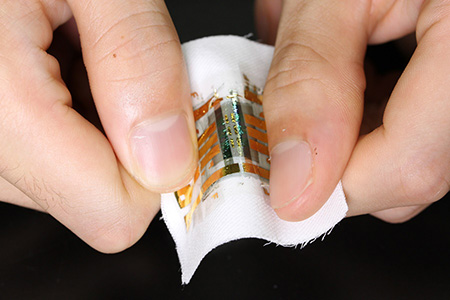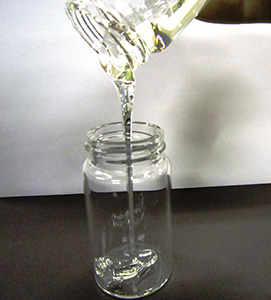ECRIOS™ Adopted as Substrate for Ultrathin Organic Solar Battery
Highly efficient heat-resistant material expected also to see use in next-gen wearables
2018.05.31
Mitsui Chemicals, Inc.
Mitsui Chemicals, Inc. (Tokyo: 4183; President & CEO: Tsutomu Tannowa) announced that ECRIOS™, newly developed polyamic acid varnish has been adopted for use in a world-first ultrathin organic solar battery that excels at both heat resistance and energy conversion efficiency. The battery was recently developed by an international collaborative research group, with members here including Toray Industries, Inc. and two national R&D organizations, the Institute of Physical and Chemical Research (Riken) and the Japan Science and Technology Agency (JST).


In acting as a precursor to colorless polyimide, ECRIOS™ exhibits excellent heat resistance, chemical resistance, toughness and dimensional stability after the conversion to the polyimide. It can be used as a heat-resistant base material in place of glass, as a flexible substrate and as a binder among other applications. ECRIOS™ will find use in products relating to next-generation electronics.
The uptake of IoT in recent years has brought about needs for wearable sensors and electronic devices. Previous attempts had been done to develop thin organic solar batteries as power sources for wearables, but these efforts did not result in a product sufficient at both energy conversion efficiency and heat resistance. Prototypes here also encountered issues with regard to providing power in high-temperature environments and when undergoing manufacturing processes that involved heat.
ECRIOS™, however, has successfully been utilized in the substrate layer as the research group’s recently developed battery. The material’s improved surface flatness and thermal stability have significantly helped in making the battery thin and heat resistant, with these values respectively sitting at a thickness of only 3 micrometers and a resistance to temperatures of up to 100 degrees Celsius.
Several other significant merits of the new battery have been achieved thanks to the superior mechanical toughness of ECRIOS™, as well as by the material’s offering of flexibility at a level not yet realized with conventional glass substrates. Specifically, these attributes have allowed the battery to be fastened to fabrics without a drop in performance, and – owing to its high transparency and elasticity – maintain freedom of design for the surface to which it is attached.
These benefits give Mitsui Chemicals high hopes that ECRIOS™ will play a major role in realizing power sources for various applications going forward, with this including wearable devices and emergency power sources for use in disaster situations.
Mitsui Chemicals will consider the research group’s adoption of ECRIOS™ as a springboard from which to further deploy the material, opening new windows regarding not only next-generation electronics but also broad range of other applications.
